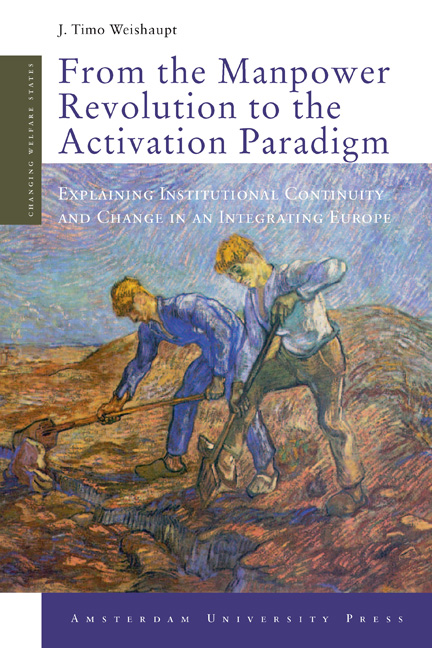 From the Manpower Revolution to the Activation Paradigm
From the Manpower Revolution to the Activation Paradigm Book contents
- Frontmatter
- Contents
- List of Boxes, Figures and Tables
- Abbreviations
- Acknowledgements
- I Introduction
- II Theoretical Approach
- Part I Origin and Crisis of European Labour Market Policy Regimes
- Part II The Emergence of the Activation Paradigm
- List of Interviews and Personal Conversations
- Notes
- Bibliography
- Index
- Changing Welfare States
II - Theoretical Approach
Published online by Cambridge University Press: 20 January 2021
- Frontmatter
- Contents
- List of Boxes, Figures and Tables
- Abbreviations
- Acknowledgements
- I Introduction
- II Theoretical Approach
- Part I Origin and Crisis of European Labour Market Policy Regimes
- Part II The Emergence of the Activation Paradigm
- List of Interviews and Personal Conversations
- Notes
- Bibliography
- Index
- Changing Welfare States
Summary
Introduction
Can modern European welfare states withstand contemporary pressures associated with economic globalisation, capital mobility, persistent, often long-term un- and underemployment, the shift from manufacturing to service economies, ageing societies, and changing gender roles and family structures, or will they converge on a minimalist, individualistic, US-style model? This substantive, empirical and theoretical puzzle is at the very heart of most welfare state scholars’ research. Facing the most severe financial and economic crisis in 60 years, many researchers have also begun asking how well European welfare states are prepared to cope with rising levels of unemployment, whether current institutional arrangements are sustainable, and how well they are equipped to generate job growth once the crisis comes to an end. In order to tackle such complex questions about the future of European welfare states, scholars need to have a good understanding of welfare states’ past and present forms and functions, that is, they need to understand their origins and evolution.
Since the mid-1980s, a variety of new theoretical approaches have emerged offering explanations of social and political phenomena, commonly referred to as the New Institutionalism (Steinmo and Thelen 1992). Three varieties within this New Institutionalism are commonly identified: Sociological Institutionalism, Rational Choice Institutionalism, and Historical Institutionalism (Lichbach and Zuckerman 1997). With respect to welfare state development, it is scholars associated with the historical-institutionalist school who have produced a substantial amount of the most influential scholarship on welfare states (e.g., Esping-Andersen 1990; Pierson 1994; 1996; Visser and Hemerijck 1997; Hall and Soskice 2001; Pierson 2001b; Rothstein and Steinmo 2002b; Streeck and Thelen 2005a; Ebbinghaus 2006; Palier 2010). In light of these seminal works, historical institutionalism is often said to have emerged as the dominant approach to explaining welfare state trajectories and institutional evolution more generally (Amenta 2003, 91f), while countless scholars use their findings as the starting point for their own research.
This book also falls in line with historical-institutionalist thought and aims to make three analytical contributions; two that are generally useful when analysing processes of institutional evolution, and one that is specific to the topic of this book. First, this book contributes to ongoing debates on regime type divergence and convergence by succinctly summarising and analytically fine-tuning the welfare state regime change trajectories theorised about in the literature.
- Type
- Chapter
- Information
- From the Manpower Revolution to the Activation ParadigmExplaining Institutional Continuity and Change in an Integrating Europe, pp. 35 - 70Publisher: Amsterdam University PressPrint publication year: 2012


